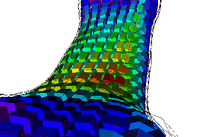Difference between revisions of "Dissemination"
m (Update from Wiki) |
m (Update from Wiki) |
||
| Line 1: | Line 1: | ||
| − | + | __NOTOC__ | |
| + | =Dissemination= | ||
| + | '''Co-PIs: Tina Kapur, Ph.D., BWH and Steve Pieper, Ph.D., Isomics''' | ||
| + | |||
| + | [[Image:Big-Dissemination-Logo.png|150px|left]] | ||
| + | As a component of NA-MIC's Outreach activities, Dissemination is closely allied with Service and Training. Our primary objective is to facilitate others to learn, teach, and perform biomedical and behavioral research using the free and open source (FOSS) NA-MIC Kit, as well as the novel methodologies and techniques developed by NA-MIC investigators. Given the complex, specialized nature of NA-MIC's technology, it is encumbent upon our organization to provide top-notch technical support to individuals with a range of expertise. We complement the pedagogical approach of the Training core, which advances subject matter expertise, by supporting the broad community of biomedical researchers who use NA-MIC technology as a key component of their medical image analysis approach. We support this community through a variety of means: (1) maintaining an extensive web-presence that includes easy access to NA-MIC publications, software, and data, (2) organizing our “flagship” Project Week working events, (3) nurturing an “open organization” through active daily use of our public wiki to organize and document our progress, (4) organizing “birds of a feather” meetings on timely topics, and (5) developing close bi-directional collaborations with external researchers who either use or strengthen the NA-MIC Kit. These efforts actively sustain a community of like-minded researchers whose work, in turn, amplifies the scope and utility of NA-MIC activities. | ||
| + | <br> | ||
| + | |||
| + | ==Focus Areas== | ||
| + | As the overall identity of NA-MIC transitions from a provider of medical image analysis technologies to a provider of integrated biomedical research solutions, these changes are reflected in our organizational objectives. | ||
| + | |||
| + | ===Impact through collaborations=== | ||
| + | [[Image:HexQual5-Dec06small.png|200 px|left]] | ||
| + | In addition to actively encouraging new collaborations, we support a network of 21 funded collaborations. These collaborative groups are actively working to use and expand the NA-MIC Kit to address specific biomedical problems across a wide range of organ systems and pathologies. Access our collaboration partners [http://www.na-mic.org/Wiki/index.php/NA-MIC_Collaborations here.] | ||
| + | |||
| + | ===Outreach events=== | ||
| + | [[Image:Dissem1.png|250px|left|thumb|Programming session during Project Week]] | ||
| + | The outreach meetings, including hands-on training workshops and working research events, serve the two-fold purpose of building an active user community around the NA-MIC Kit and gathering in-person feedback to improve the materials that form the basis of the online learning resources mentioned above. Each year we offer a host of clinically oriented Project Events, which feature hands-on training and research using the end-to-end solutions developed by previous and current DBPs (i.e., Lupus, Prostate Cancer, Autism, Schizophrenia/velocardiofacial syndrome, Atrial Fibrillation, Huntington's Disease, Head and Neck Cancer, Traumatic Brain Injury). | ||
| + | Access our calendar of upcoming events [http://www.na-mic.org/Wiki/index.php/Engineering:Programming_Events here]. | ||
Revision as of 20:53, 13 December 2016
Home < DisseminationDissemination
Co-PIs: Tina Kapur, Ph.D., BWH and Steve Pieper, Ph.D., Isomics
As a component of NA-MIC's Outreach activities, Dissemination is closely allied with Service and Training. Our primary objective is to facilitate others to learn, teach, and perform biomedical and behavioral research using the free and open source (FOSS) NA-MIC Kit, as well as the novel methodologies and techniques developed by NA-MIC investigators. Given the complex, specialized nature of NA-MIC's technology, it is encumbent upon our organization to provide top-notch technical support to individuals with a range of expertise. We complement the pedagogical approach of the Training core, which advances subject matter expertise, by supporting the broad community of biomedical researchers who use NA-MIC technology as a key component of their medical image analysis approach. We support this community through a variety of means: (1) maintaining an extensive web-presence that includes easy access to NA-MIC publications, software, and data, (2) organizing our “flagship” Project Week working events, (3) nurturing an “open organization” through active daily use of our public wiki to organize and document our progress, (4) organizing “birds of a feather” meetings on timely topics, and (5) developing close bi-directional collaborations with external researchers who either use or strengthen the NA-MIC Kit. These efforts actively sustain a community of like-minded researchers whose work, in turn, amplifies the scope and utility of NA-MIC activities.
Focus Areas
As the overall identity of NA-MIC transitions from a provider of medical image analysis technologies to a provider of integrated biomedical research solutions, these changes are reflected in our organizational objectives.
Impact through collaborations
In addition to actively encouraging new collaborations, we support a network of 21 funded collaborations. These collaborative groups are actively working to use and expand the NA-MIC Kit to address specific biomedical problems across a wide range of organ systems and pathologies. Access our collaboration partners here.
Outreach events
The outreach meetings, including hands-on training workshops and working research events, serve the two-fold purpose of building an active user community around the NA-MIC Kit and gathering in-person feedback to improve the materials that form the basis of the online learning resources mentioned above. Each year we offer a host of clinically oriented Project Events, which feature hands-on training and research using the end-to-end solutions developed by previous and current DBPs (i.e., Lupus, Prostate Cancer, Autism, Schizophrenia/velocardiofacial syndrome, Atrial Fibrillation, Huntington's Disease, Head and Neck Cancer, Traumatic Brain Injury). Access our calendar of upcoming events here.


